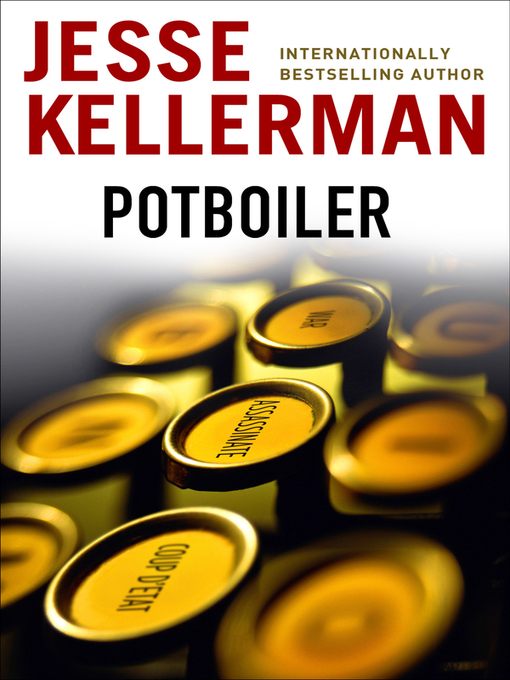
Potboiler
کتاب های مرتبط
- اطلاعات
- نقد و بررسی
- دیدگاه کاربران
نقد و بررسی

February 20, 2012
Kellerman’s insightful satire on publishing, bestsellers, and series continuing long after an author’s demise opens promisingly. Years earlier, Arthur Pfefferkorn’s one coming-of-age novel received “mild acclaim but sold poorly.” Arthur now ekes out a living as an adjunct professor “at a small college on the Eastern Seaboard.” He seethes over the success and wealth of his oldest friend, bestselling thriller writer William de Vallée, who married Arthur’s first love, Carlotta. After William is lost at sea, Arthur finds his friend’s last manuscript, plagiarizes the story, and becomes a bestselling author. But the price of Arthur’s new success unfurls into events that could be lifted from his thriller—a series of betrayals and double crosses with the fate of the world hanging in the balance. Kellerman (The Executor) makes witty use of thriller clichés, especially at the rousing finale, but the flaccid middle section suggests that this one-note joke might have worked better at novella length. Agent: Liza Dawson, Liza Dawson Associates.

Starred review from July 15, 2012
Seldom, if ever, have the cloak-and-dagger folk--of any stripe, ours or theirs--appeared so omniscient, so omnipotent and so perfectly awful as they do in Kellerman's mordantly funny latest. If you put the question to him--and he was of a mind to answer it--Arthur Pfefferkorn would probably acknowledge that, yes, he'd led one of those gray lives up to now, a life without much in the way of accomplishment. He was what he was--a middle-aged English professor at an undistinguished university, whose courses were neither flocked to nor fled from. True, there was that long-ago novel: respectful reviews, bleak sales figures. This, of course, is in marked contrast to the performance of internationally famous William de Vallee, who pumps out bestsellers as if they were pellets from a shotgun and who happens to be Arthur's oldest and best friend. But then suddenly, Bill is lost at sea, occasioning in Arthur's life what amounts to a sea change. Deeply involved in this are the luscious Carlotta, Bill's not-so-grieving widow, and a certain unfinished thriller, the completion of which implies Arthur's acceptance of that old fictional standby: the Faustian bargain. Turns out that Bill wasn't just an internationally famous, bestselling author. He was also a highly effective American spy, whose loss has created an intolerable vacuum. He has to be replaced. "Tag," says the satanic superagent who explains all this to Arthur. "You're it." And just like that, Arthur Pfefferkorn's life goes from gray to incandescent. Another brilliant performance from Kellerman (The Executor, 2010, etc.). Potboiler? Hardly. Kellerman has fun here, and so will his readers.
COPYRIGHT(2012) Kirkus Reviews, ALL RIGHTS RESERVED.

May 1, 2012
Arthur Pfefforkorn is a middle-aged sad sack of a college professor and washed-up literary novelist, having published one novel decades ago. In contrast, his best friend, the international best-selling thriller writer William de Vallee, has sold millions of copies and garnered enthusiastic reviews. Pfefferkorn holds his friend in secret disdain because the writing, well, isn't very good. But when de Vallee (a nom de plume, of course) is lost at sea and Pfefferkorn reunites with the widow and his former flame at the funeral, his life suddenly gets a little complicated. Intrigue and political machinations ensue. Really. VERDICT This satire-heavy novel works well in the first half. There are truly funny observations about publishing, what merits good writing, and the excesses of the thriller genre. However, the second half descends into the political intrigue of a made-up country, Zlabia, and the joke feels more than a little old by the end. Some thriller readers will pick this up on the strength of Kellerman's (The Executor; The Genius; Trouble; Sunstroke) name and will be confounded, but a few will actually love this odd hybrid of a book. [See Prepub Alert, 12/5/11.]--Andrea Y. Griffith, Olympia, WA
Copyright 2012 Library Journal, LLC Used with permission.

May 1, 2012
Creative-writing instructor Arthur Pfefferkorn published his only novel decades ago, but no one noticed. Arthur is morose, wallowing in his failure as a writer. He thinks often about his lifelong friend, Bill, who not only gained wealth and fame as the author of a slew of best-selling thrillers, he also married Carlotta, the woman Pfefferkorn loved. Envy has kept him from seeing Bill and Carlotta, but when Bill is lost at sea, Arthur decides to attend the memorial service. That decision changes Arthur's life forever and tosses him into a bizarre world of duplicity and danger. Kellerman (The Executor, 2010) plays this one largely for laughs, casting Pfefferkorn into the murky animosities that animate two tiny Eastern European countries, East and West Zlabia; said animosities are rooted, delightfully, in a 400-year-old literary dispute. But Kellerman is simply too interesting a writer to leave it at that. He also ruminates on the practice of writing, the experience of sudden literary success, the nature of friendship, and the contrasts between the lives of writers and spies. Potboiler is very funnyand insightful.(Reprinted with permission of Booklist, copyright 2012, American Library Association.)

























دیدگاه کاربران